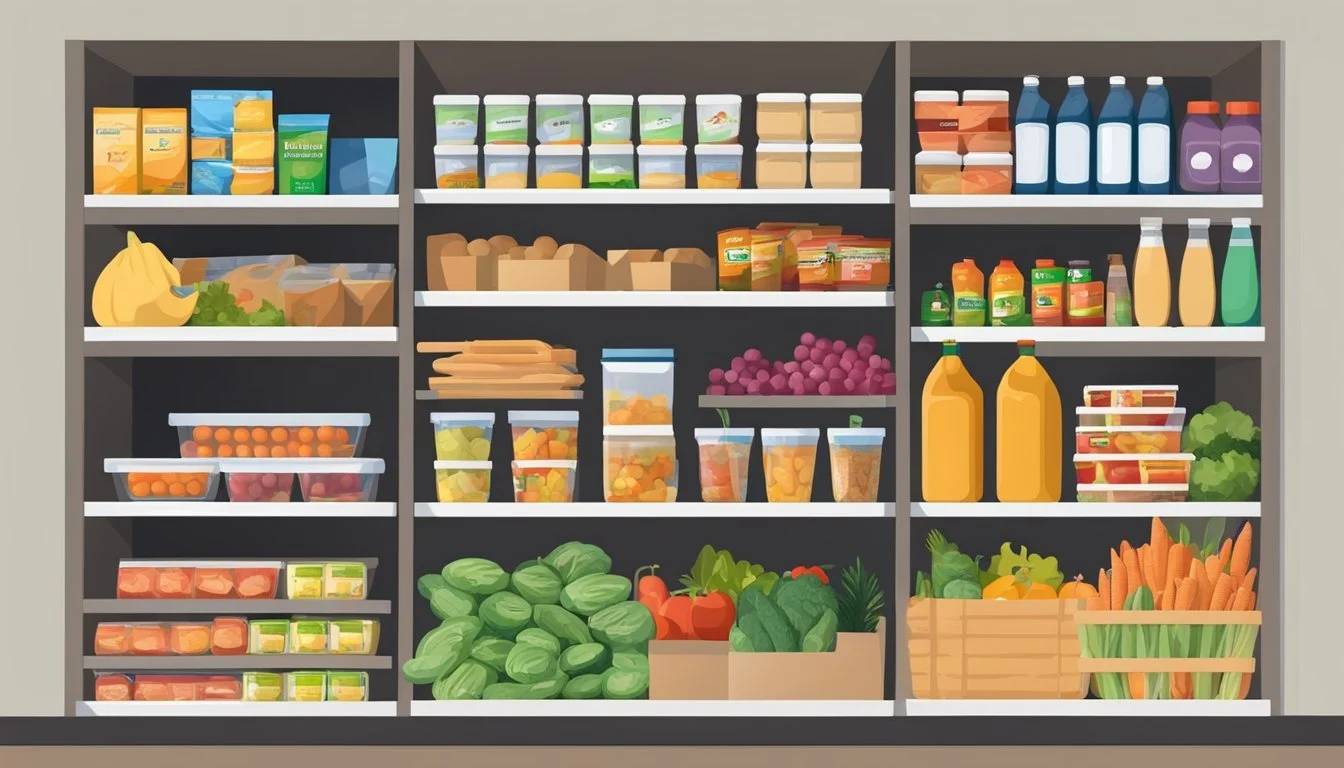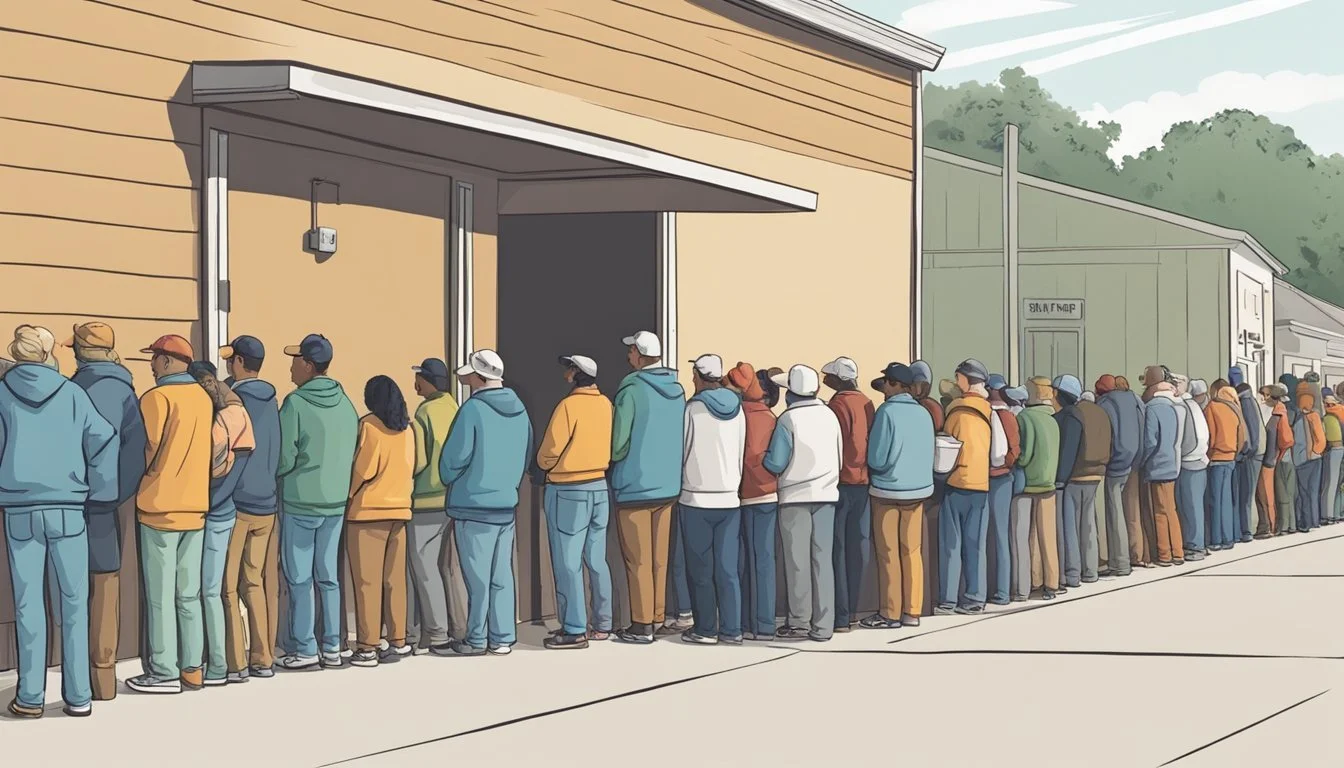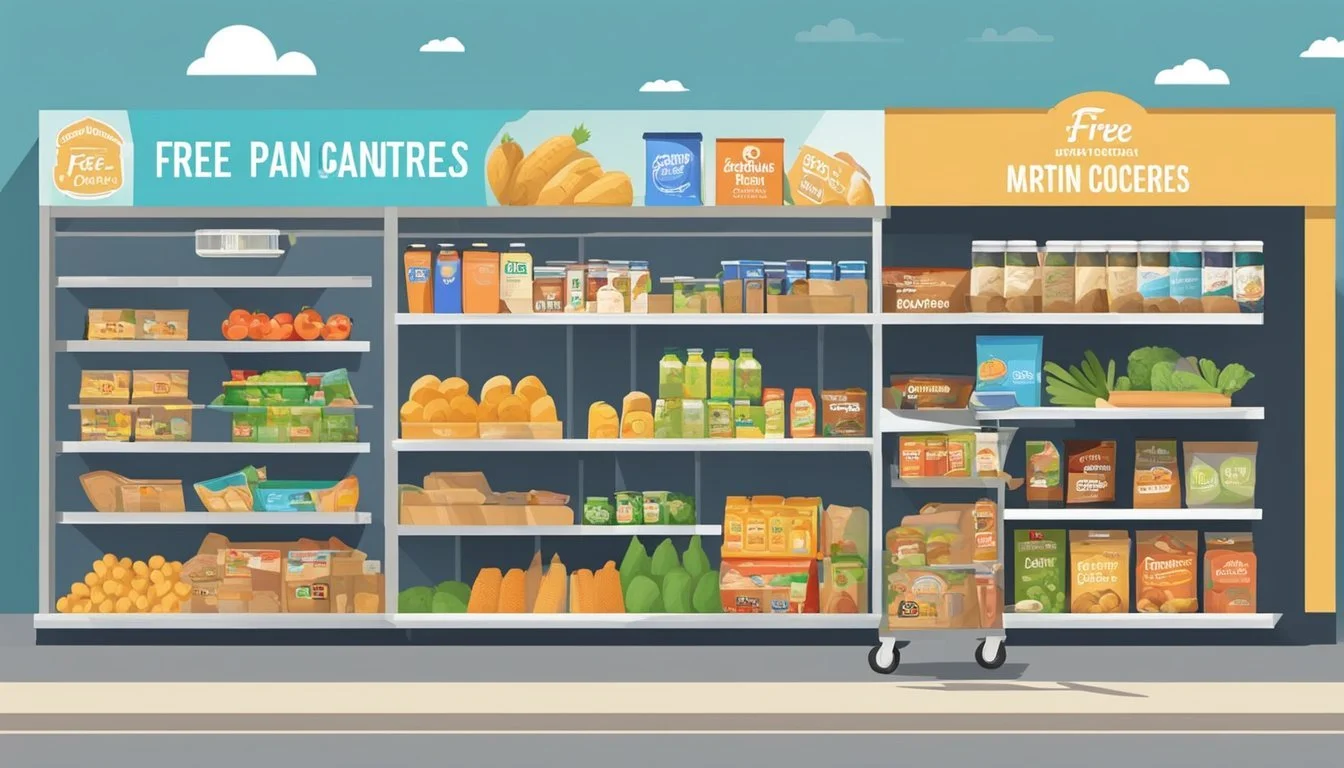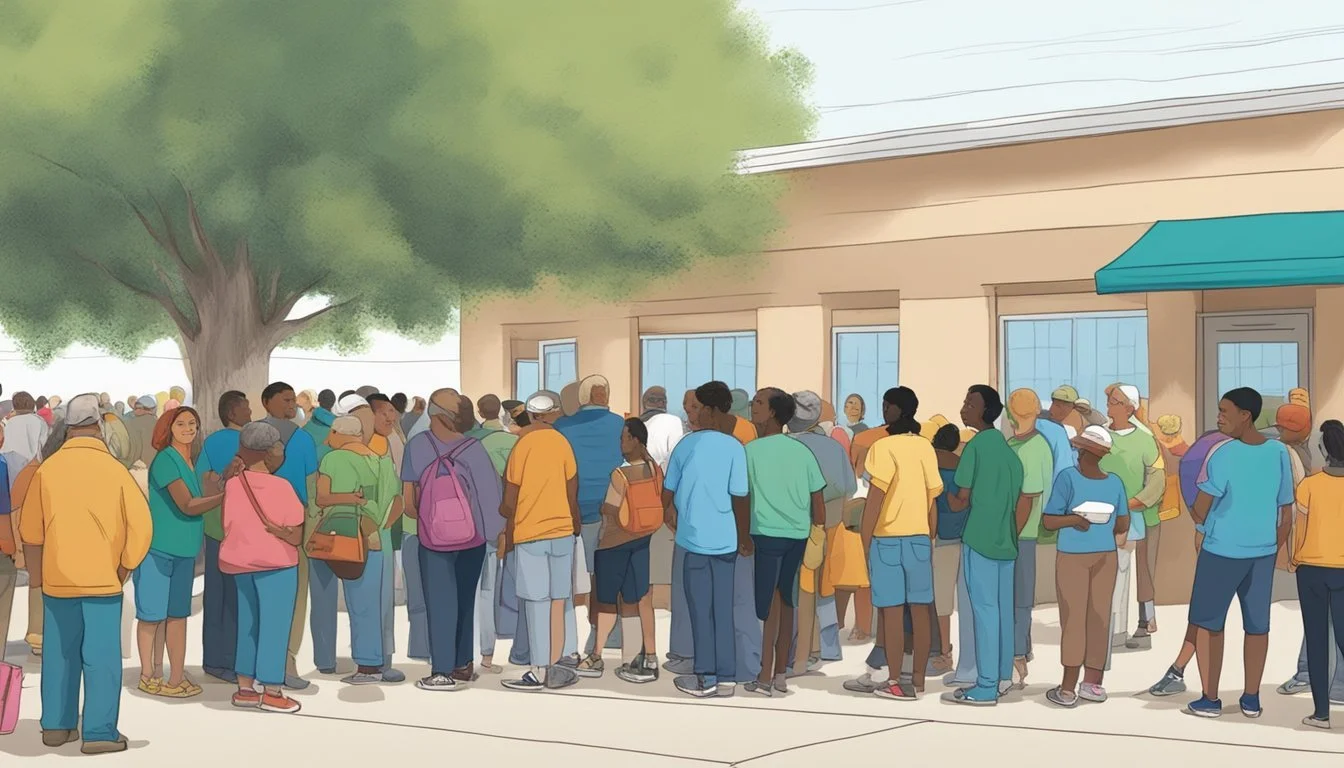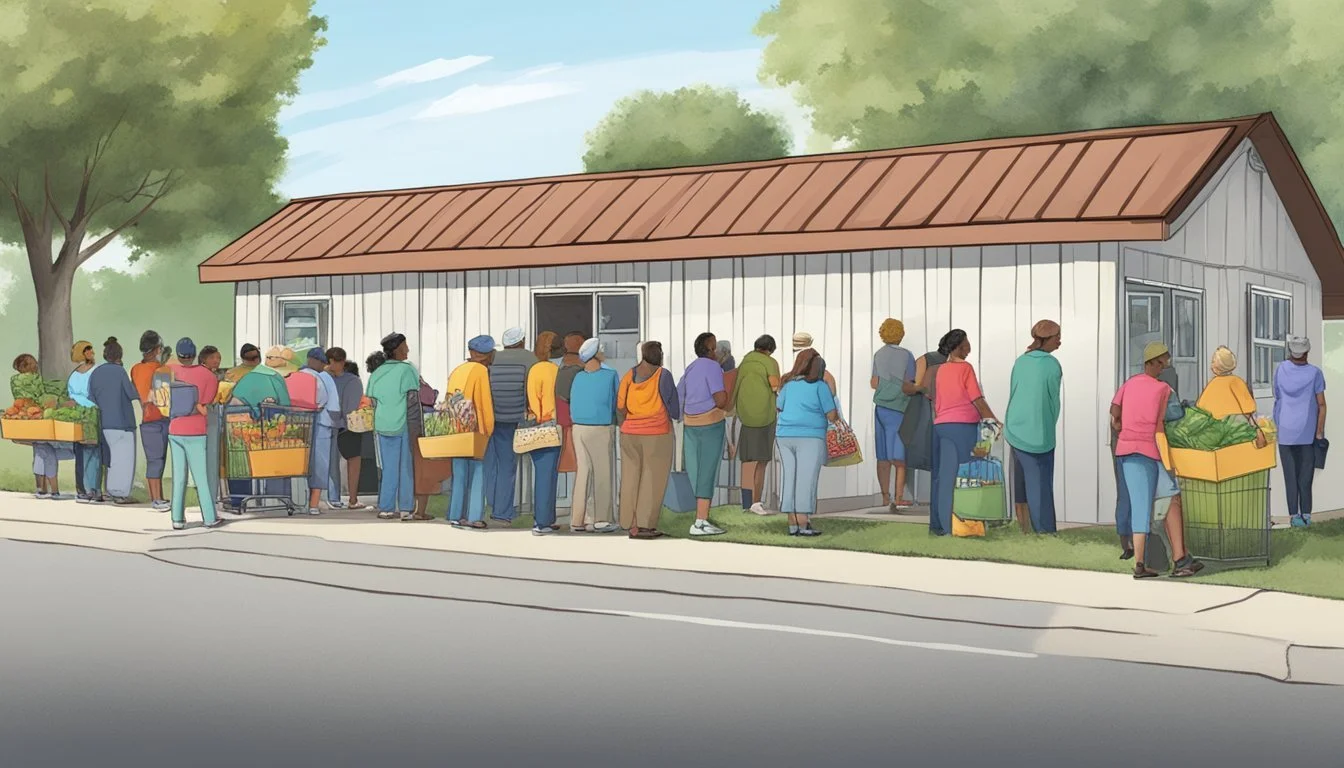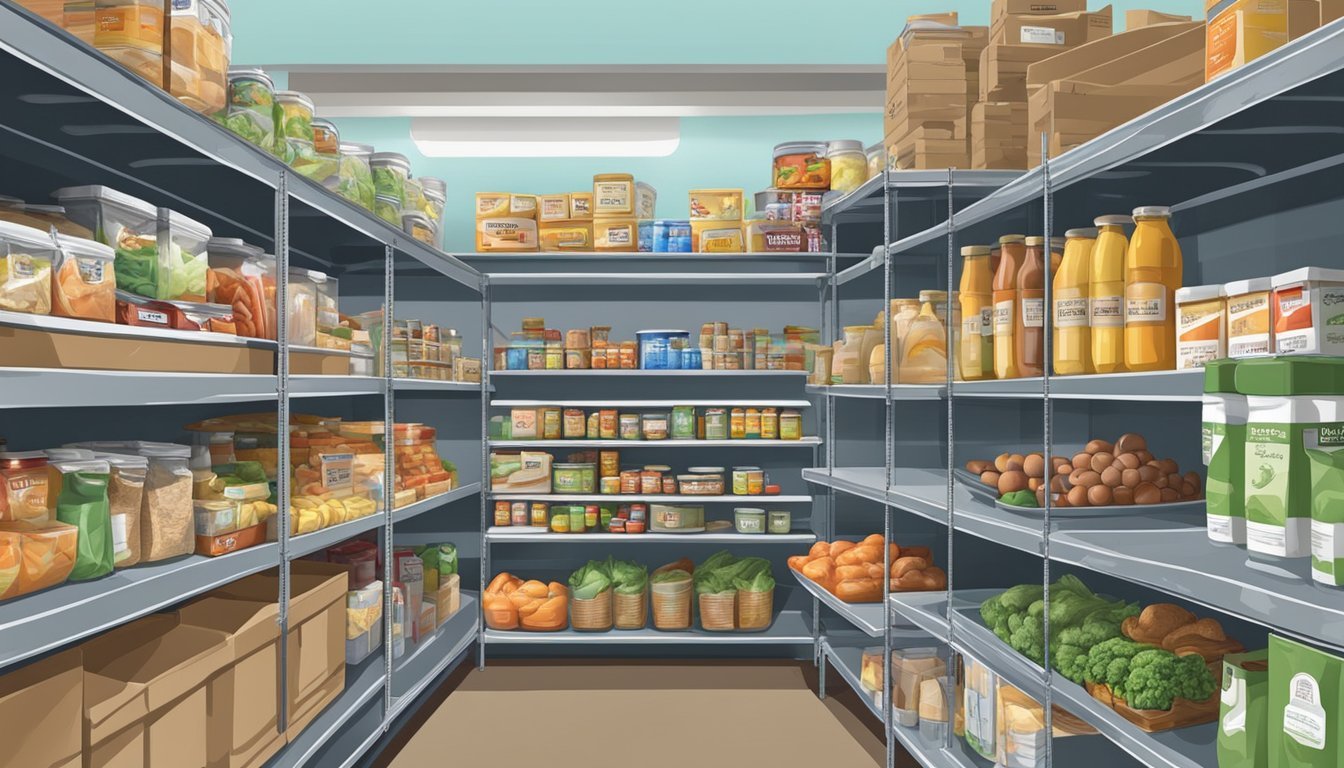Free Groceries and Food Pantries in Martin County, Texas
Your Guide to Local Food Assistance Programs
This Article is Part of Our Guide on Free Groceries in Texas
In Martin County, Texas, individuals and families facing food insecurity have access to essential resources through a network of food pantries dedicated to providing free food and groceries. These pantries operate on the foundation that access to food is a fundamental need and they strive to ensure that no resident goes hungry. With a cooperative spirit, these services range from stationary food pantries, offering a consistent location for food collection, to more dynamic initiatives like mobile food banks that deliver directly to the community.
The Martin County Food Pantry in Stanton, Texas, serves as a prime example of these community-oriented efforts, supporting residents through regular food distribution events. They operate with a commitment to equality, providing aid regardless of background as an equal opportunity provider. While the physical pantries offer a scheduled and structured method for food pick-up, the mobile pantry program increases accessibility by meeting residents where they are, bringing nourishment to those who may not reach a permanent location.
To enhance convenience and maintain dignity, some pantries in the area have adopted a drive-thru model. This allows residents to receive pre-packed grocery items and fresh produce without leaving their vehicles. This approach not only simplifies the process for those seeking assistance but also expands the reach of these vital services throughout Martin County, ensuring that help is within reach for anyone in need.
Understanding Food Insecurity in Martin County
Martin County faces a critical challenge with food insecurity affecting a diverse group of residents, from low-income families to the elderly. This section delves into the dimensions of the issue, shedding light on its definition, the impact on families, and revealing critical statistics.
Defining Food Insecurity
Food insecurity refers to the lack of consistent access to enough food for an active, healthy life. It is a situation that may stem from the unstable economic conditions, including insufficient income or unemployment. In Martin County, food insecurity is not always linked to homelessness or extreme poverty but often affects working families who earn just enough to be ineligible for certain aid but too little to meet all of their nutritional needs.
The Impact of Food Insecurity on Families
Families affected by food insecurity in Martin County deal with the stress of not knowing where their next meal will come from. This can lead to a host of issues, including nutrient deficiencies, exacerbated chronic illnesses, and mental health struggles. Children in food-insecure households may face difficulties in academic performance and social development. The strain of food insecurity extends beyond the individual, affecting family dynamics and parental mental health.
Statistics and Data
In Martin County, data reflects a challenging picture:
Income and Employment: A correlation exists between higher unemployment rates and increased food insecurity. Even a one percentage point rise in unemployment can lead to a significant uptick in those needing food assistance.
Demographics Most Affected:
Low income households are more susceptible to food insecurity due to limited financial resources.
Elderly individuals often have to choose between medication and food on a fixed income.
Families, especially those with several members or a single parent, are at higher risk as their income-to-mouths-to-feed ratio is often disproportionate.
Illustrative statistics:
Group Percentage Affected by Food Insecurity Low Income High Unemployed Correlated with higher food insecurity Elderly Sizeable affected population Family Members Particularly at risk
These statistics highlight the urgent need for robust food assistance programs and community support in Martin County.
Local Food Pantries Overview
In Martin County, Texas, local food pantries play a crucial role in providing essential assistance to residents in need. They serve as pivotal points of contact for individuals and families seeking food security.
What Are Food Pantries
Food pantries are local, non-profit organizations that distribute free groceries to individuals and families facing food insecurity. They typically operate on specific days and hours, offering a range of food items, from canned goods to fresh produce. Pantries in Martin County may require documentation, such as proof of residency or income, to ensure that aid reaches those most in need.
Roles and Importance of Food Pantries
Food pantries serve the community by ensuring access to nutritious food for life's sustenance. They are an integral part of the larger network of food banks that source and store food to be distributed through pantries and meal programs. The significance of these pantries lies in their role in both alleviating immediate hunger and contributing to long-term food assistance for Martin County residents. Collaboration with various assistance programs can augment their efforts, providing comprehensive support beyond just groceries.
Finding Free Groceries
In Martin County, Texas, residents in need can access free groceries through an organized network of food pantries and banks. These services aim to alleviate hunger by providing staples to individuals and families struggling to purchase enough food.
Locating Food Pantries and Banks
Martin County hosts a number of food pantries and banks that are dedicated to distributing free groceries to residents. Organizations like Feeding America oversee a network of over 200 member food banks, which individuals can connect with for assistance. Residents can locate the nearest food pantry or bank by visiting the Feeding America website and entering their zip code to find nearby locations.
Food Distribution Events
Occasionally, special food distribution events take place in Martin County. These events, often organized as drive-thru pantries, provide a large amount of groceries at once. During such events, volunteers assist in directing traffic and loading pre-packed boxes or bags of food directly into attendees' vehicles. Information about upcoming food distribution events requires checking local community boards, non-profit websites, or social service agency announcements.
Eligibility for Free Groceries
Eligibility for free groceries typically depends on household income and size, though many food banks prioritize serving all who are in need. Additionally, residents may apply for the Supplemental Nutrition Assistance Program (SNAP), formerly known as food stamps, which provides financial assistance for purchasing food. Updates to federal programs and eligibility criteria post-COVID-19 are available on related government and charitable organization websites. To determine specific eligibility, individuals should contact their local food assistance providers or look into SNAP requirements through state social service agencies.
Operating Hours and Locations
For individuals and families in Martin County, Texas seeking free groceries, it’s essential to be aware of when and where they can access food pantry services. This section provides up-to-date information on the operating hours and locations of local food assistance centers, including drive-thru pantry services.
Food Pantry Operating Hours
Martin County, TX Food Assistance Center
Address: [Specific Address], Martin County, TX, [Zip Code]
Hours of Operation:
Monday - Friday: 9:00 AM - 4:00 PM
Saturday: 9:00 AM - 12:00 PM
Sunday: Closed
Food assistance centers in Martin County offer varying hours of operation to accommodate the schedules of the community. Residents should ensure they check the most recent hours prior to visiting, as times may vary based on holidays or weather conditions.
Drive-Thru Pantry Services
Martin County Drive-Thru Pantry
Address: [Specific Address], Martin County, TX, [Zip Code]
Drive-Thru Hours:
Wednesday: 10:00 AM - 2:00 PM
Drive-thru pantry services are designed for convenience, allowing individuals to receive food without leaving their cars. This service offers a mix of nutritious free food and groceries with specific hours of operation each week. Locations and hours for drive-thru services are subject to change, and it is advisable for residents to contact their local food bank for the latest distribution details.
Additional Assistance Programs
In Martin County, residents who require aid beyond traditional food pantries have options including soup kitchens and federal assistance programs. These resources provide immediate meals and long-term assistance to ensure no individual or family goes hungry.
Soup Kitchens and Meal Programs
Soup kitchens and meal programs are crucial resources for individuals facing immediate food insecurity. These services offer prepared meals, typically on a daily or weekly basis. Such programs are designed to fill the gap for people needing a hot meal without any cost or prior arrangement. Feeding America is one example of an organization that may provide information on these services in the community.
Government Aid and SNAP
Government aid programs such as the Supplemental Nutrition Assistance Program (SNAP) offer long-term support. Eligible residents can receive financial assistance to purchase groceries. The Special Supplemental Nutrition Program for Women, Infants, and Children (WIC) provides additional support to mothers and young children. These programs work by providing benefits loaded onto cards that can be used like a debit card to buy eligible food items.
SNAP Food Stamps: For those eligible, these benefits can be used to buy groceries at participating stores.
WIC: Specifically aids pregnant women, new mothers, and children up to age five with nutritious food options.
Residents can apply for these government programs at local offices or through online state resources to determine eligibility and receive aid.
Other Resources and Services
In addition to food assistance, Martin County, Texas, provides a range of other essential services. These resources aim to meet the broader needs of the community, including clothing, personal items, and health-related programs.
Clothing and Personal Items Distribution
Organizations in Martin County extend beyond food aid by offering clothing to those in need. These services often include a variety of apparel suitable for different ages and seasons. Moreover, essentials such as personal hygiene products, baby formula, and diapers are frequently accessible, crucial for family and emergency situations.
Clothing Items: Shirts, pants, seasonal outerwear
Personal Hygiene Products: Soap, toothpaste, feminine products
Family Essentials: Baby formula, diapers
Health and Wellness Programs
Health and wellness programs play a pivotal role in the support system provided by the community. Martin County offers programs focused on health education, preventive care, and sometimes basic health services. These programs aim to improve the overall well-being of residents and ensure access to necessary medical information and resources.
Preventive Services: Health screenings, flu shots
Wellness Education: Nutrition classes, fitness programs
By offering these additional resources, Martin County strives to address the comprehensive needs of its residents, contributing to a stronger, healthier community.
Community Involvement and Volunteering
Community members in Martin County, Texas play an integral role in addressing food insecurity through their support of local food banks and pantries. Volunteers are the backbone of these non-profit organizations, contributing significantly to their operations and outreach.
How to Volunteer
Volunteers interested in supporting their community can engage with local food banks and pantries. To begin volunteering, they can pledge to assist with various tasks, such as:
Sorting and packing food items.
Distributing groceries at food drives or mobile pantry events.
Managing food collection drives in collaboration with local businesses and schools.
Individuals can find volunteering opportunities by contacting non-profits directly or visiting their websites to sign up. For instance, in Martin County, Texas, volunteers can connect with local pantry programs and inquire about their needs and scheduling.
Benefits of Volunteering
Volunteering at food banks and pantries offers several benefits, not only to the community but to the volunteers themselves. Some of these benefits are:
Sense of Community: Volunteers enhance solidarity by working with a diverse group of individuals towards a common goal.
Skill Development: They gain valuable experience in logistics, people management, and operational efficiency.
Personal Fulfillment: Volunteering provides a sense of purpose, as one contributes to the well-being of those in need.
Volunteers are a vital link in the chain of support for families and individuals facing food scarcity. By donating their time, they ensure that essential services continue to reach those who need them most.
Extended Services for Holidays and Events
In Martin County, Texas, residents have access to specialized food assistance programs during holidays and summer months. These services ensure that individuals and families facing food insecurity can celebrate without the stress of meal planning and children receive nutritious meals when school is not in session.
Holiday Meal Programs
The Salvation Army in Martin County plays a pivotal role during the holiday season. It often extends its services by providing holiday meal programs, ensuring that no member of the community goes without a festive meal. To access these services, individuals may need to show proof of need, and it's advisable to check in with the local Salvation Army for specific holiday schedules and requirements.
Summer Meals for Children
When school is out, the need for consistent, nutritious meals remains. Summer meal programs step in to fill this gap. Meals on Wheels is one such initiative that not only serves seniors but also extends to children during summer break. They deliver meals directly to those who cannot easily travel to a food pantry or who may not have access to school meal programs during the holidays. This direct form of assistance ensures that children receive the nourishment they need to enjoy a healthy and active summer.
Useful Information for Visitors
Visitors seeking food assistance in Martin County can benefit from a variety of services offered by local food pantries. These services provide essential support in the form of free groceries, often with the convenience of drive-thru options.
What to Expect at a Food Pantry
Visitors should expect to find a range of services designed to address food insecurity. Food pantries typically offer a selection of staple items like canned and dried goods, as well as fresh produce and sometimes even dairy and meat products. Services offered may vary, but the primary goal is to provide nutritious food items to those in need. At drive-thru pantries, visitors can obtain food without leaving their vehicles, making food collection both convenient and discreet.
Hours of Operation: Visitors should check pantry hours as they may vary by location.
Eligibility Requirements: Some pantries may require proof of residence or income.
Item Selection: Expect a mix of non-perishable and perishable items.
Making an Appointment
Many pantries in Martin County allow or require visitors to make an appointment. This helps manage the flow and ensure visitors receive attention efficiently. To make an appointment, a visitor can typically call ahead or sometimes schedule online, if the pantry offers that service. Information required at the time of booking an appointment may include the number of household members, address, and whether this is a first-time visit or a repeat service.
Contact Methods: Phone, email, or online forms.
Documentation to Bring: Proof of address or income, if required.
Scheduling: Appointments may be required, especially during peak times or for special distributions.
Directory and Contact Information
In Martin County, Texas, individuals in need of food assistance can find support through various local food pantries. These pantries provide essential contact information to ensure those seeking help can connect with available resources.
Local Food Pantry Directory
The Little Free Pantry-Martin
Address: Martin, TN - 38237
Hours: Daily 7:00am - 10:00pm
This pantry operates a community-supported system where individuals can take what they need and leave resources for others where possible.
Getting in Touch with Food Pantries
Contacting The Little Free Pantry:
Phone: (731) 819-4326
Email: Use the pantry's contact form or listed email address.
Visitors can request more information or inquire about volunteer opportunities. Pantries often update their hours and services, so it's advisable to reach out directly for the most current details.
How to Donate to Food Pantries
When considering a contribution to local food banks, donors can support their community by providing essential items most needed by these pantries and by organizing food drives that help stock their shelves with a variety of goods.
Items Most Needed
Food pantries generally prioritize obtaining a variety of non-perishable food items that provide balanced nutrition to individuals and families they serve. Specific items that are typically in high demand include:
Canned proteins: tuna, chicken, beans
Whole grains: rice, pasta, cereal
Canned vegetables and fruits
Fresh produce is also welcomed, though it requires checking with the local food bank for their capacity to store such items properly. Additionally, special dietary items, like gluten-free or low-sodium foods, can greatly assist those with specific health needs.
Organizing a Food Drive
To organize a successful food drive for a local food bank, one must plan the event, gather volunteers, and promote the drive to collect as much as possible. Below are the steps to consider:
Coordinate with the local food bank: Get in touch to understand their needs and how best to support them.
Gather Volunteers: Assemble a team dedicated to managing different aspects of the food drive, from collection to transport.
Promotion: Use social media, local events, and community boards to spread the word about the food drive.
Collection and Delivery: Set up centralized collection points and ensure proper transportation to deliver the donations to the food bank.
Each donation helps ensure that individuals and families facing food insecurity have access to the nutrition they need.

